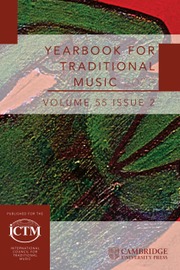Crossref Citations
This article has been cited by the following publications. This list is generated based on data provided by
Crossref.
Kyker, Jennifer W.
2013.
Listening in the Wilderness: The Audience Reception of Oliver Mtukudzi’s Music in the Zimbabwean Diaspora.
Ethnomusicology,
Vol. 57,
Issue. 2,
p.
261.
Kyker, Jennifer
2014.
Learning in Secret: Entanglements between Gender and Age in Women's Experiences with the ZimbabweanMbira Dzavadzimu.
Ethnomusicology Forum,
Vol. 23,
Issue. 1,
p.
110.
Ngara, Renias
2014.
Gender and Sexuality, a Reflection on Rainmaking Songs.
The Anthropologist,
Vol. 17,
Issue. 2,
p.
465.
Saidi, Umali
2017.
agonya neiko mfanha uyu?Of death and funerals – a semiotic exploration of the Shona funeral ritual in Zimbabwe.
African Identities,
Vol. 15,
Issue. 4,
p.
353.
Musanga, Terrence
2017.
“Ngozi” (Avenging Spirit), Zimbabwean Transnational Migration, and Restorative Justice in Brian Chikwava’s Harare North (2009).
Journal of Black Studies,
Vol. 48,
Issue. 8,
p.
775.
Govender, Nadaraj
and
Mudzamiri, Edson
2022.
Incorporating indigenous artefacts in developing an integrated indigenous-pedagogical model in high school physics curriculum: views of elders, teachers and learners.
Cultural Studies of Science Education,
Vol. 17,
Issue. 3,
p.
827.
Gutsa, Ignatius
2022.
Making Ends Meet: Experiences of Older Women Heading Households in Rural Domboshava, Zimbabwe.
African Studies,
Vol. 81,
Issue. 2,
p.
170.
Magwati, Phineas
2024.
Magagada
leg rattles in Karanga
jukwa
dance performances: a spiritual and symbolic ‘talking’ instrument
.
Journal of the Musical Arts in Africa,
Vol. 21,
Issue. 1-2,
p.
37.
Hove, Rabson
2024.
The Role of the Church in Postcolonial African Burial Rituals in Collins Chabane Municipality: A Pastoral Perspective.
Religions,
Vol. 15,
Issue. 9,
p.
1104.
Maluleke, Alois
2024.
Exploring Ubuntu-Based Research Methodologies in Southern African Bantu People's Embodied Movements: Ethical Considerations, Community-Based Strategies, and Philosophy.
Conversations Across the Field of Dance Studies,
Vol. 43,
Issue. 0,
Mafuriranwa, Richard
Watts, Lynelle
and
Hodgson, David
2024.
A phenomenological study into Zimbabwean-Australian clergy’s understandings of the causes and their responses to mental health problems among Zimbabwean-Australians.
Journal of Religion & Spirituality in Social Work: Social Thought,
Vol. 43,
Issue. 3,
p.
300.
Nenjerama, Theophilus Tinashe
2025.
Indigenizing Christianity: Indigenous instruments in the Zimbabwean United Methodist Church.
Missiology: An International Review,
Vol. 53,
Issue. 1,
p.
84.


